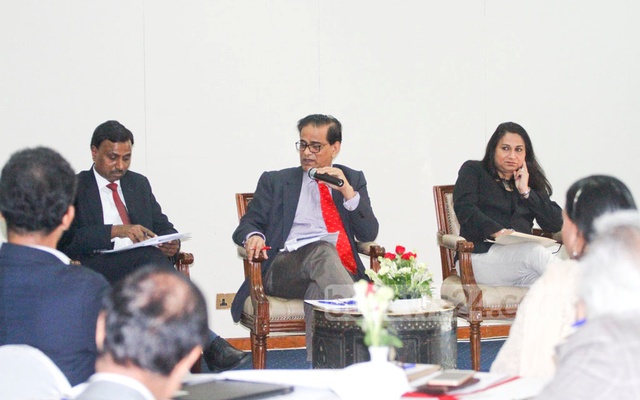Job growth slowed down in Bangladesh: World Bank analysis

Contrary to the common notion, the pace of job creation in Bangladesh has slowed down despite robust economic growth, according to a new World Bank analysis.
The ‘Jobs Diagnostic’ showed the annual growth rate of employment fell to 1.8 percent in 2010-15 after growing 2.7 percent annually between 2003 and 2010. The growth, however, remained stalled in the key garment sector during the period.
But, the GDP per capita was 5.2 percent in 2010-15 while it was 4.7 percent in 2003-10 period.
Around two million workers enter the labour market each year, of which on an average 400,000 find employment abroad, according to government statistics.
Thomas Farole, the lead author of the World Bank Jobs Diagnostic, said the relationship between GDP growth and jobs growth is not “straightforward”.
“The main issue that people seem to be focusing on is that GDP has grown steadily over the past 5-10 years. And job growth was also fairly steady through 2010,” he told bdnews24.com.
“But more recently jobs growth has slowed down, even though GDP growth has actually increased a bit. Why is this happening? There is no simple answer,” he said, on the sidelines of a workshop on Monday where the report was presented.
The World Bank and the ILO jointly organised the workshop. A panel discussion was also followed by the launching of the analysis.
Farole said that “part of the answer is that productivity has increased which is by definition is we have more output without more workers then these workers are more productive."
"This is actually good news because higher productivity should lead to more competitiveness of Bangladeshi firms, which should lead to higher wages and more investment."
“But at the moment, that investment is perhaps slowing down… and here government can help change things and get investment and job creation back on track by addressing many of the things discussed by the panel”.
Those are investing in improving skills of workers, improving business regulations to support the growth of firms and attract FDI, trade, tax, and competition policies that support diversification of the manufacturing sector, infrastructure to improve the competitiveness of cities, among others.
Farole said jobs slowdown in the export-oriented RMG sector underscores the need for continued structural shifts in the economy.
The World Bank team used the labour force surveys, economic census and survey on manufacturing industries of the Bangladesh Bureau of Statistics for their analysis.
They suggested Bangladesh proactively address the challenge - starting with the development of a National Jobs Strategy to increase the pace of formal job creation, raise the quality of jobs, and connect vulnerable workers to jobs.
The report also highlights the importance of looking into the job-related issues holistically.
“Addressing the job issues requires policies that establish the macro and microeconomic frameworks to stimulate private sector investment, promote education and skills development, and support innovation, urbanisation and mobility,” said Rajashree Paralkar, Acting Country Director for Bangladesh of the World Bank.
“We look forward to the development of a National Jobs Strategy - a comprehensive set of coordinated policy actions that are targeted explicitly toward addressing the jobs priorities.”
ILO country director Srinivas Reddy said the goal number-8 of the SDGs has three components which are inclusive economic growth, productive employment and decent work.
The report also highlighted that Bangladesh needs to generate quality jobs and address gender disparities.
Only 1 in 5 workers are employed as wage- worker which means they earn a regular wage which is 'a set amount paid at a set time' - weekly, monthly.
Further, 1 in 3 working women, as opposed to 5 percent of working men, are engaged in unpaid work.
International migration has been a way for many Bangladeshis to seek better-paying jobs in spite of costs and risks to worker safety, according to the report.
Finance Minister AMA Muhith in his budget speech on June 1 outlined targets and strategies for generating employment in the proposed budget for fiscal 2017-18.
He pointed out the structure of Bangladesh’s economy saying it was undergoing 'robust changes' and the share of industry and service sectors in GDP is gradually rising.
A programme titled 'Executive Development Programme’ or EDP has been introduced to meet the skill deficit at the mid and upper levels of management in the industry sector, he had said.
news:bd news 24.com/6-jun-2017Other Posts
- Emranul Huq, Acting Managing Director of Dhaka Bank Limited and Prof. Rubina Hamid, Chairperson of Sunlife Insurance Company Ltd. exchanging a MoU singing documents at the banks head office in the city on Tuesday. Mustafa Hossain, Manager of Dhaka Bank Gu
- Yunus committed seditious offence
- Tk 100, Tk 500 new notes from Jun 11
- Agent banking getting popular with remitters
- No change in excise duty on bank balance, says Muhith
- Md Sanaullah Shahid, EC Chairman of Shahjalal Islami Bank Limited presiding over the 711th meeting at the bank head office in the city recently. Farman R Chowdhury, Managing Director, Akkas Uddin Mollah, Anwer Hossain Khan, Khandaker Sakib Ahmed, Director
- Md. Fazlul Karim, Deputy Managing Director of Al-Arafah Islami Bank Limited, presiding over a discussion on 'Ramzan & Al-Quran' as chief guest arranged by the bnak's Dilkusha Branch in the city on Monday. Abdur Rahim Khan, Vice President, Shariah Supervis
- Home > World 1 Share India launches fraud investigation into news channel's founders
- Islamic banking investment stood at Tk 1770.93 billion in first quarter of 2017
- Md Abdul Halim Chowdhury, Managing Director of Pubali Bank Ltd. and Tony Menzies, Chief Operating Officer of HSBC Bank exchanging agreement singing documents on Correspondent Banking at Pubali Bank head office in the city on Tuesday. Under the deal, HSBC
- MA Mannan, Chairman and Managing Director of Butterfly Marketing Ltd. and M Nazeem A Choudhury, Head of Consumer Banking, Eastern Bank Ltd exchanging documents after signing a Payroll Banking agreement in the city recently. Senior officials from both the




Comments